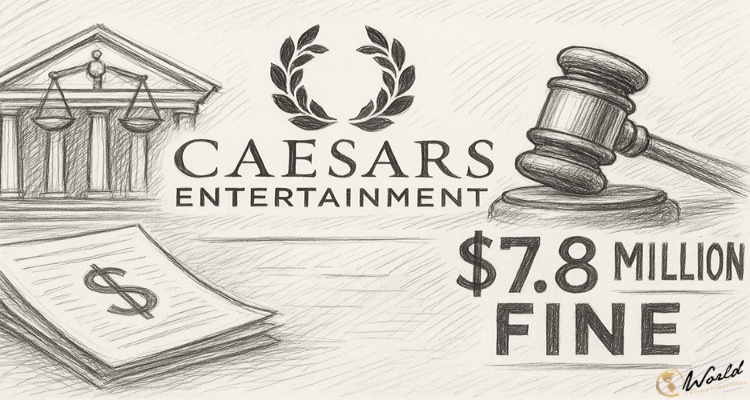Caesars Palace in Las Vegas and its affiliated entities have agreed to pay a $7.8 million fine after Nevada regulators outlined extensive anti-money laundering lapses involving California bookmaker Mathew Bowyer. The Nevada Gaming Control Board (NGCB) filed a five-count complaint describing how Caesars continued hosting Bowyer despite years of internal warnings pointing to unverifiable income and significant risk concerns.
Regulators Detail Long-Running Oversight Failures
According to the complaint, Bowyer had been wagering at Caesars Palace from before 2017 through January 2024. Internal reviews flagged him as suspicious as early as 2017, primarily due to the casino’s inability to identify a legitimate source of funds. Multiple due diligence checks reached the same conclusion, yet Bowyer continued to gamble large sums at Caesars properties, including Caesars Palace, Harrah’s Resort Southern California, and Harveys Lake Tahoe (now Caesars Republic Lake Tahoe).
Bowyer, whose name gained prominence after taking bets from Shohei Ohtani’s former interpreter, Ippei Mizuhara, gambled heavily at Caesars despite lacking income to match his betting patterns. Mizuhara stole millions from Ohtani to cover gambling debts, though Ohtani himself was not implicated. Bowyer is now serving a 12-month sentence for operating an illegal gambling business, money laundering, and filing a false tax return.
The regulator’s filing shows a repeated pattern: Caesars noted concerns about Bowyer, suspended his account, accepted documents he provided, and reinstated him despite ongoing uncertainty about the legitimacy of his funds.
In 2017 alone, Bowyer deposited more than $4 million in front money across several trips to Caesars Palace, even as the casino recorded that his “source of funds/employment could not be determined.” That same year, two other Las Vegas casinos had already banned him — information Caesars documented but did not act on.
Concerns escalated in June 2019 when the casino received an anonymous call identifying Bowyer as a “bookie.” Shortly after, Caesars classified him as “high risk” due to unverifiable income and more than $2 million in losses over the prior 12 months. His account was suspended the following month but reinstated after he presented his 2018 tax return and claimed winnings of just under $3 million from the Cosmopolitan.
Risk assessments continued to flag him. In November 2020, the casino again listed his income as “undetermined/unverifiable.” In May 2021, he was again labelled high risk, with a “314b request” noted in connection with financial information sharing under the Patriot Act.
By July 2021, Caesars suspended his account once more after concluding he “may be a bookie.” Bowyer provided his 2019 and 2020 tax returns, and the suspension was lifted in September 2021. A year later, Caesars reported “no revenue found” for three businesses he claimed to operate.
Despite accumulating documentation of risk, Bowyer was only banned in January 2024. Regulators emphasized that Caesars acted only after media outlets reported a federal raid on Bowyer’s Orange County home.“Media outlets reported extensively on Bowyer, including his activities in Las Vegas casinos, his operation of an illegal bookmaking business, and his money laundering activities,” the complaint states, as reported by the Nevada Current.
Broader Regulatory Pressure and Industry Fallout
Caesars is the third Las Vegas operator tied to Bowyer-related failures. Resorts World paid $10.5 million earlier this year, and MGM Resorts settled for $8.5 million. Industry-wide enforcement has surged in 2025, with combined AML-related fines surpassing $30 million before Caesars’ penalty was added.
The NGCB accused Caesars of five failures: not establishing Bowyer’s funding sources, not banning him despite known issues, insufficient due diligence after negative information surfaced, not escalating the matter to AML officers, and not conducting adequate investigations.
Caesars stated: “At Caesars Entertainment, integrity and regulatory compliance are paramount. We fully cooperated with the Nevada Gaming Control Board throughout its investigation and are committed to maintaining strong anti-money laundering and ‘know your customer’ programmes.”
Nevada’s regulators have stressed growing concern about repeated AML violations across major Strip operators. The NGCB’s chair has indicated that escalating enforcement — including larger fines — will remain on the table should operators continue demonstrating what regulators view as recidivist behavior.
As Caesars navigates the fallout, the company faces a challenging stretch marked by declining Las Vegas performance, regulatory uncertainty around prediction markets, and setbacks in its New York casino ambitions. Meanwhile, Bowyer’s activities continue reverberating across the industry, prompting intensified scrutiny of AML failures throughout Nevada’s gaming landscape.



